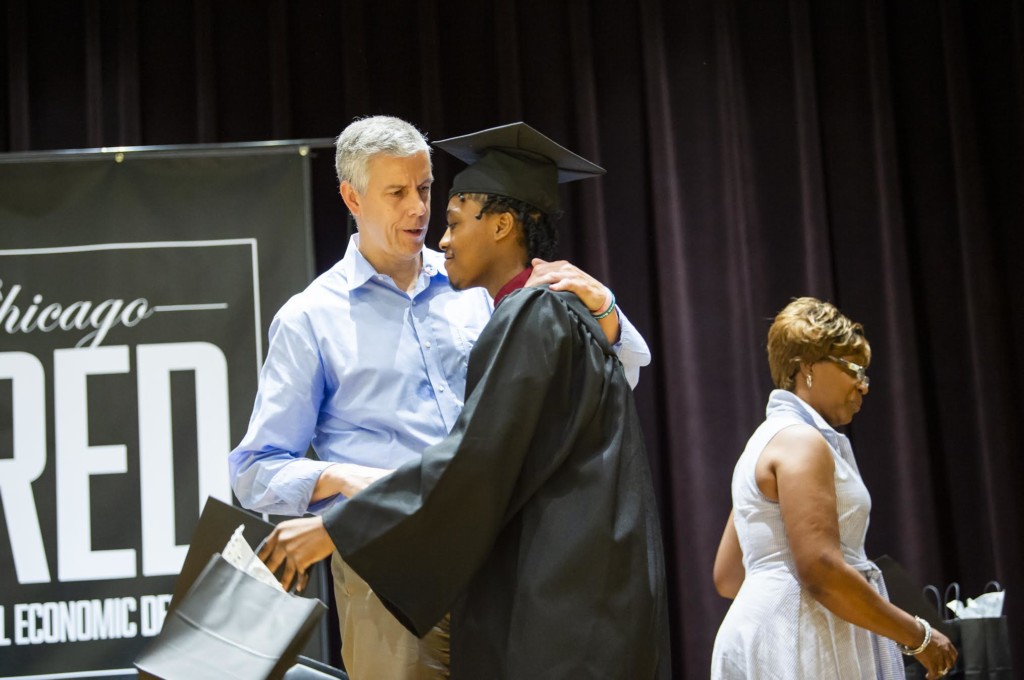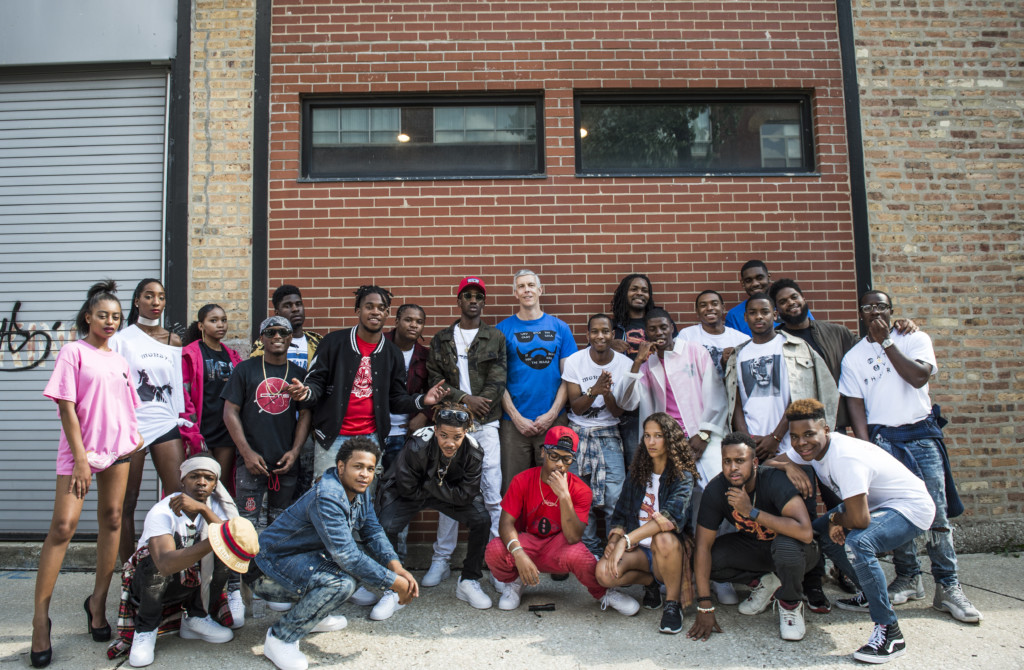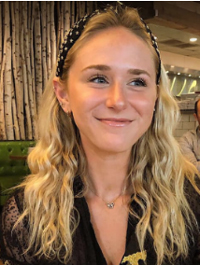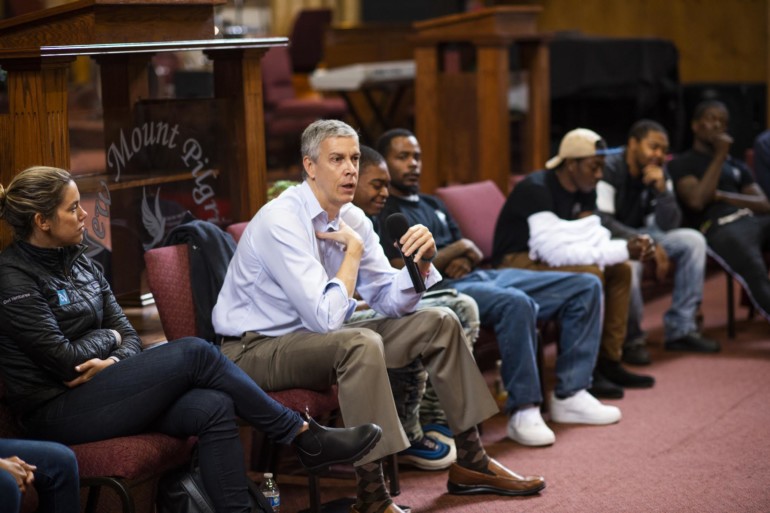In 2015, after working in D.C. as President Barack Obama’s Education Secretary, Arne Duncan returned home to Chicago. In a house just two blocks from where he grew up in Hyde Park, Duncan wasted no time in getting back to work. This time, to confront Chicago’s most critical crisis: gun violence.
“Chicago has given me everything,” Duncan said. “For me to come back to this city and not work on this—I couldn’t have lived with myself.”
Duncan’s father was a professor at the University of Chicago, while his mother, Sue Duncan, ran a tutoring center for inner-city youth on Chicago’s South Side. Sue, like her son is doing today, saw the need for investment on Chicago’s South Side and worked tirelessly to address education inequality. Her work, Arne said, had a hugely formative impact on him and his siblings.
Like many Chicagoans, Duncan is, unfortunately, too familiar with the devastation of gun violence. As a teen, playing pick-up basketball at courts on the South and West Sides of the city, he lost several friends. And, as an adult, serving as the CEO of Chicago Public Schools, he lost a student to gun violence—on average—every two weeks.
“All of the stuff that was supposed to be hard about my job, academic achievements, budgeting, labor management, operations—was all easier than going to the funerals of those kids,” Duncan said. “Going to classrooms where there was an empty desk and having to make sense of the senseless to a group of kids. It just got harder.”
And at home, Duncan and his wife, Karen, had two young kids of their own.
A City in Crisis
When Duncan left Chicago for Washington, D.C. in 2009 to work in the Obama Administration, he thought the city had hit rock bottom. Unfortunately, he was very wrong. In 2016, Chicago saw 778 deaths—its deadliest year since the 1990s. And now, in 2020, in part collateral damage of the coronavirus pandemic and national unrest, the city is on track to surpass that number. Tragically, gun violence killed many young children this year.
With citywide violence up 51%, it is hard to feel hopeful. But, in one of the city’s 15 most violent neighborhoods, Roseland on the South Side, violence has actually decreased by 33%. By no coincidence, Roseland is the neighborhood in which Duncan’s gun violence prevention program, Chicago CRED, has worked the longest. In just over four years, they’ve seen more than 310 men through the Roseland program.
“If you want to stop shootings, you need to work with shooters,” Duncan said. “All my life I have worked on the prevention side, and while that is hugely important, there are not enough folks working with the guys actually doing the shooting.”
The Heart of the Matter
When developing CRED, Duncan had countless conversations with men at Cook County Jail to understand what programming would be most effective. And, what he heard surprised him. Dozens of men told Duncan that they would be willing to put down their guns for $12 to $13, a reality that is heartbreaking– but also solvable. He concluded that gun violence in Chicago is more an economic problem than a crime problem.
It took Duncan and his team just seven days to find their first group of men in Roseland. One of the men, arguably the most at-risk member of the group, made $80 a day on the streets. CRED nearly doubled his income. And, that, Duncan said, made putting down a gun to join CRED a very rational choice.
Participants are connected to mentors, with whom they develop personal and professional goals. CRED pays participants to partake in their workforce development program, where they refine skills and prepare for employment. After graduation, they are able to work for one of nearly four dozen employers that hire through CRED. Graduates have worked in culinary, hospitality, manufacturing and construction. They also currently have two men working at law firms in the city, and another at Deloitte Consulting.
A First Chance
“People always tell me how great it is that I’m giving these guys ‘a second chance,’” Duncan said. “But, I’m not. We’re giving them a first chance. For most of the men we work with, every structure in their lives—whether it was family or church or school—all those structures failed them. The one structure that was always there to pick them up, was a street gang—it was a rational choice. What we’re doing [at CRED] is giving them a second rational choice.”

CRED’s comprehensive programming works through five pillars: street outreach, mentorship/counseling, clinical support, education and workforce development. Each pillar is essential to their work, because addressing largescale systemic violence is multifaceted.
Beginning with street outreach, CRED’s team works to identify and recruit active shooters—men, and some women, who are at-risk of falling victim to cycles of violence. Duncan makes the important distinction that while the reality is many folks in Chicago carry guns, they are not all considered active shooters.
Breaking the Cycle
A huge factor in CRED’s impact is the team’s own personal experience. Many of the folks at CRED have themselves served jailtime—or had family or friends who have—and have since made a commitment to the next generation’s liberation from that same cycle. Part of this is addressing trauma, which is where their clinical team comes in. Duncan explained that the trauma most of these men deal with has been lifelong. “Hurt people, hurt people,” Duncan said.
Recently, one of these street outreach workers was able to negotiate a hostage situation to peaceful resolution. Law enforcement and SWAT team members were both present, but because this outreach worker had a relationship with the person, they stood down and allowed him to mitigate. It was a non-traditional move that required trust and cooperation, but no one got killed.
“This has been a horrible year for the city,” Duncan said. “We have to be willing to try something different. I’d love to see greater emphasis on actually working with shooters and giving them a reason to put down the guns.” He later added, “it’s relationships that change lives, not programs.”
It’s the program’s emphasis on this face-to-face relationship building that has been most affected by the coronavirus pandemic. Duncan said that while virtual programming was necessary, it is not ideal for the work they’re doing. However, they’ve found a silver lining in front porch conversations. Duncan said that he’s spent more time than ever sitting on porch steps and talking to guys outside, which has been really helpful for deepening some bonds. It’s a matter of always being proximate and available to the men in the program.
Right before the pandemic, Duncan was beginning to see changes he had once only dreamed of. To gauge the program’s effectiveness, CRED constantly analyzes crime metrics. However, Duncan thought it important to directly ask community members, and the men he works with, if they feel safer. Despite seeing double-digit reductions in violence across the city the last three years, no one was saying they actually felt safer. It was not until more recently that Duncan’s participants in Roseland told him that they do notice a change. When asked what felt different, their response was that CRED was reaching all of the right people.

“These guys are living in a warzone. That’s just reality,” Duncan said. “If there’s just a few less bullets flying, you’re not going to feel safer. There has to be a structural reduction—a systemic repression of violence—across the community before it actually starts to feel safer to walk and take your kids to the park.”
An effort like this takes the support of the entire community, from local government to Chicagoans across the city. For the last four years, CRED has been both funding violence prevention work and actively doing the work. They also work with and support various community partners, like Inner-City Muslim Action Network (IMAN) and Institute for Non-Violence Chicago, local organizations that have been doing essential on-the-ground work for years.
According to Duncan, everyone has a role to play. Chicago’s violence prevention efforts have been largely funded philanthropically from the private sector. Duncan emphasizes that public safety is ultimately a public good and getting the city to further invest in their work is critical. Besides the obvious devastation, gun violence is also incredibly costly for the city. While experts disagree on how to determine an exact cost, the Boston Consulting Group estimated direct costs to be more than $3 billion in 2018—and this number does not include emotional trauma.
“Our goal is that two to three years from now, we will be in a radically different place,” Duncan said. “But, that’s going to take all of our combined efforts and we have hard work to do. I’m both wildly hopeful, and feel a huge sense of urgency.”
Chicago’s 2021 Budget Engagement Survey showed that 87% of Chicagoans were in support of reallocating money from the $1.68 billion Chicago Police Department budget into other programs. The same survey concluded that most Chicagoans ranked community services as being the most important city service, alongside public health. The city currently spends $11 million on violence prevention programs. This increased public consciousness may be the result of the ongoing racial justice movement sparked by George Floyd’s death on May 25.
“Our guys really are the solution,” Duncan said. “These are amazing young men that have been through so much and have somehow persevered. If we can walk with them, learn from them and continue to empower them—that’s what gives me the greatest amount of hope.”

More From Better:
- It’s Glow Time in Chicago: Watch the Star-Studded 2020 BMO Harris Magnificent Mile Lights Festival at Home
- 2020 Holiday Gift Guide: Gifts for Everyone on Your List
- 12 Thanksgiving Movies to Keep You in the Holiday Spirit

Madison Muller is the Assistant Digital Editor at Better. A recent graduate of Northwestern’s Medill School of Journalism, she approaches our contemporary media environment with compassion and candor. She is interested in writing about the intersectionality of social justice issues in marginalized communities and environmentalism. Madison proudly supports Action Now, a community organization that empowers and uplifts residents on Chicago’s West Side.
She also encourages reading and supporting The Marshall Project, a non-profit news organization that seeks to create and sustain a sense of national urgency about the U.S. criminal justice system.
You can keep up with her reporting on Twitter and Instagram.

